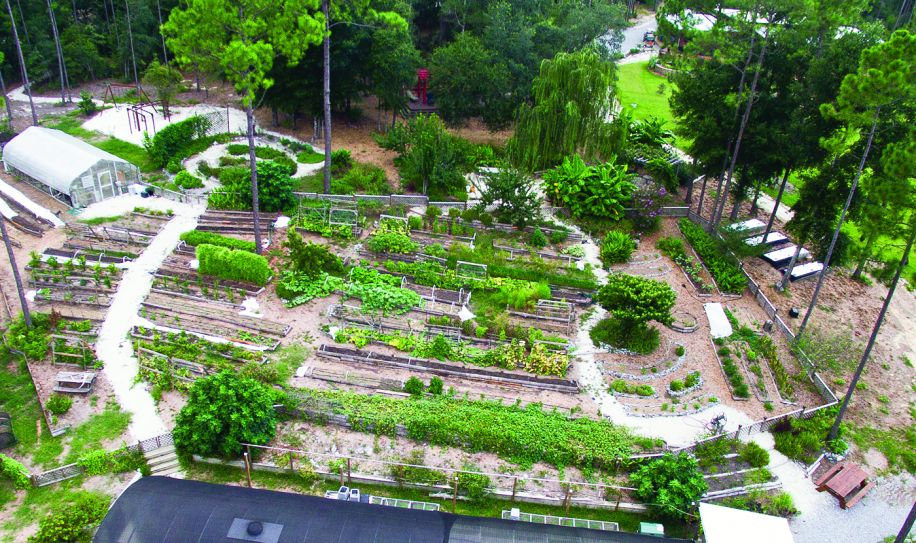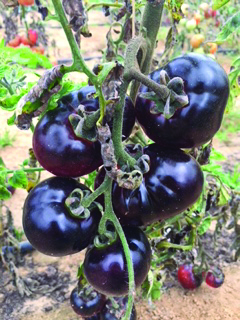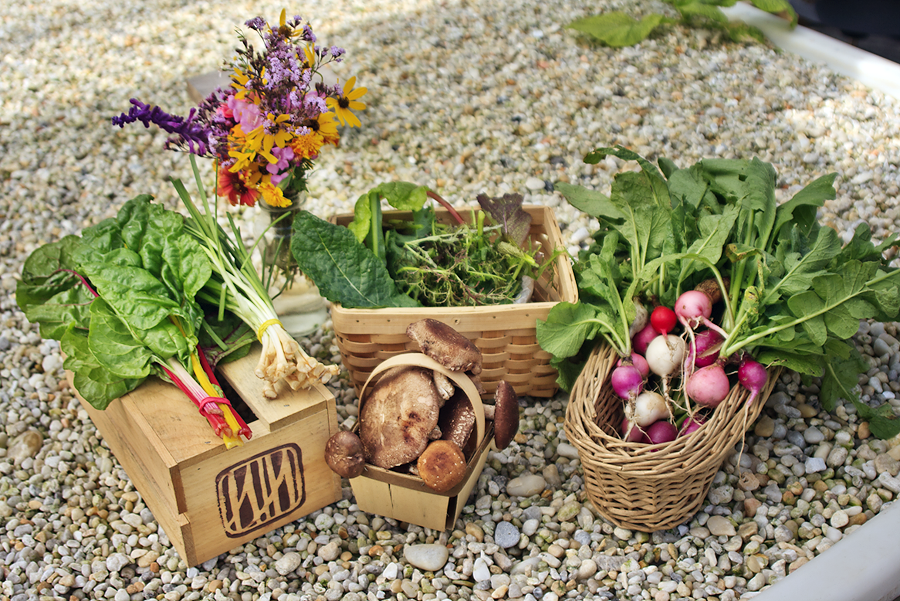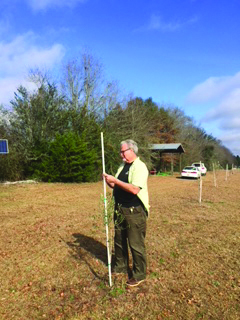Buy local.
What exactly does that term mean when it comes to food? Are you making some assumptions along with what you think you know?
We here in the Panhandle of Florida are in an enviable agricultural position. Our growing opportunities pretty much never end and for a foodie like me, that’s pretty darn amazing. Unlike our northern neighbors, our winter cultivation season is long and fruitful.
There is a lot of farming going on just outside of our city limits. Much of it is larger row crop operations that ultimately leave the area and become part of America’s junk food, but there is a trend starting to emerge towards smaller farms that grow and sell locally. A visit to the Palafox Market on any given Saturday is proof that this community really wants to support its local farmers.
Sourcing food is the single most important thing I do for my health. I have an autoimmune thyroid condition that requires me to be fully educated about my food and the chemicals used during its growth. The easiest way for me to find out how my food is handled from seed to sale is to talk to the farmer that grows it.
The biggest misconception about locally grown food is this: Locally grown also means it’s organic. Local and organic are two mutually exclusive terms and one has absolutely nothing to do with the other.
At farmer’s markets nationwide the labeling struggle is real. By law, unless you have a USDA Organic certification, you can’t post on signs or say that you are selling “organic” produce even if you are using the same growing practices required for the designation. It is a very expensive and lengthy process to get the USDA designation and for the average small operation it’s not an expenditure that’s easy to recoup.
The face of farming is changing. In addition to sustainable long term growing practices, one of Florida’s largest crops is suffering. Citrus! See the sidebar to learn more about one local man who is testing the water for future cultivation.
Below are some of my favorite vendors that are meeting or beating the expectations for “organic” and sustainable growing practices.
Crescere Farms, Holt FL
Jim Eveleth and Deb Donnelly are the owners of Crescere, with Jim farming and Deb helping to sell and market their product. They first appeared at the Palafox Market in early 2017. Surprised by their appearance I was happy to hear from my friend and trusted farm gal from Coldwater Gardens, Ashley, that she had visited their operation and was giving them two thumbs up. Great news!
Crescere’s crops beds are covered in Quonset shaped hoop houses. One of the perks of growing in this manner is you have the ability to control the use of beneficial pests during cultivation. Bees are easily introduced and retained for pollination as are lady bugs that eat other not so great bugs, mostly aphids, eliminating the need for toxic chemical laden pesticides. This also keeps the flying friends inside and working instead of getting distracted and flying off.
This farm is best known at the Palafox Market for their amazing heirloom tomatoes that come in a wide variety of colors, shapes and sizes. They also sell heirloom squash, whole Cornish hens, eggs, quail and chicken parts great for making bone broth. I buy my chicken feet from them which makes highly gelatinous bone broth, great for healing a compromised gut. They have recently planted their first non-tomato hoop house that will render produce ready for sale about the time this article publishes.
Jim learned how to grow tomatoes “from the Dutch” who have a great reputation for growing inside with great success, even during the colder months. There is nothing nicer than seeing what I’d commonly refer to as a “fresh summer tomato” at the end of January. Pensacola is “winning” on this front.
They also sell carefully blended and prepared mature compost for all of your own growing needs. Visit them at the Palafox Market on Saturdays or visit their website for more info. http://www.crescerefarms.com
The Santa Rosa Place, Milton, FL
Virginia Bates first farming job came when she was 11. She worked with her grandfather bush hogging his fields and plowing the land. That same land is currently “resting” from conventional growing practices (it takes 3 years after traditional cultivation before land can be considered for organic status). She has always had a passion for clean food and hopes to seize the opportunity to farm that land with more sustainable practices in the future.
In April of last year she started selling her tiny but mighty product – micro greens. These nutritional power houses are grown in a temperature controlled and insulated grow house in Milton and sold at the Palafox Market as well as several local retailers in the greater Pensacola area. You can find her products at Ever’man, Apple Market, and So Chopped as a salad bar selection.
Virginia is very passionate about this particular product for several of reasons, but she is particularly attracted by their incredible nutritional value. During our conversation she referenced a 2012 University of Maryland study on micro greens that discovered that they have 4 to 40 percent more nutrition than their more mature counterparts, sprouts. She says, “It enables me to provide something to people who would otherwise not be able to get that nutrient content.”
Micro greens don’t need soil to grow. Virginia uses organic ground coconut husks as her growing medium, and because they are harvested so quickly, they need nothing more than water and sunlight to grow. The spent growing husks makes for good compost, creating a permaculture environment that is completely sustainable.
She sells grow kits for $10 – $35. She also sells seeds and a proprietary blend growing medium that you’ll need should you choose to continue your own cultivation from home. This is a great project for children and adults. Get your grow on, Pensacola.
These tiny sprouts pack an amazing flavor punch. Stop by and get a sample at the Pensacola Market. She doesn’t currently have a website but you can find her on Facebook at https://www.facebook.com/TheSantaRosaPlace/ or Instagram @superteeniegreenies.
Coldwater Farms, Milton, FL
Coldwater was the first local clean grower that I supported at the Palafox Market and it was pretty much love at first sight. Their gorgeous weekly displays at the market drew me in quickly. They are “proud to allow any customer to come see our operation and ask/see exactly what our growing methods are.”
They sell a wide variety of produce and when the girls are laying, eggs. The cultivate their own mushrooms and have an incredible variety of all things green (my personal favorite). Last week I had something completely new to me, wasabi greens. One of my favorite winter items is their turmeric. Turmeric is a powerful anti-inflammatory and you should integrate it into your diet where possible. Be careful, it stains!
After visiting their Milton location, you’ll likely be smitten. The staff is incredibly knowledgeable and friendly and there is a little something for everyone who visits. Aquaponics, hydroponics, land and shitake mushroom cultivation make for an interesting opportunity to learn and see some incredible natural beauty.
Garden tours are free and self-guided but if you want to schedule something with a staff member that is an option as well. You can also pay to use the property (hiking, biking, etc) for the day. They charge by the carload.
Coldwater functions as an Eco-Resort with a twist. In addition to their farm operation they have a variety of accommodations for visitors from camping to cottages and cabanas. They are also a very busy wedding destination. Be sure to ask if you can buy produce to take home with you when you leave. Sometimes they have it available in the main building.
Just in case you have some loose change rattling around in your pocket, the operation is currently FSBO (for sale by owner). You can learn more about them visiting their website at http://coldwatergardens.com/
ASK YOUR FARMER
Want to know if the produce you are buy is grown with organic methods? It’s simple, just ask. You might be surprised to discover that many growers not only meet but exceed the USDA Organic standards. Once you establish if a farm has growing methods that are satisfactory developing a relationship with them long term benefits you both.
Don’t assume anything. Ask!
As Nick Phoenix from Coldwater Farm says, “Trust between a grower and buyer is the best thing that can happen for the small farm movement.”
Don’t be shy. Your health is important. Here are some questions.
Are you using organic growing practices?
Are you using pesticides/herbicides?
If yes, are they USDA Organic or OMRI (Organic Materials Review Institute) certified?
Do you use fertilizers and soil amendments?
If yes, are they USDA Organic or OMRI (Organic Materials Review Institute) certified?
Gather whatever info you might need and google away when you get home. You are ultimately responsible for determining if the food you purchase meet your standards.
New Crops Coming!
You may not know about greening, a deadly disease that is devastating citrus crops worldwide. A lot of the Florida’s agricultural economy comes from citrus cultivation and sadly, this disease is spreading throughout the state’s citrus growing regions. As a result, they are testing crops that could potentially replace the citrus that don’t survive the onslaught.
One such potential crop is olives.
Milton businessman, Mike Thomas, owns Blackwater Olive Grove situated across the street from the University of Florida West Florida Research and Education Center in Jay. He has planted 1,100 olive trees of varying varieties and is hopeful that they will bear fruit within the next year. He’s an olive novice, but gets good feedback from his neighbors across the street who are testing a variety of olives on their property as well
His intention is to have a “you pick” farm as well as to make oil from the olives.
By growing this crop he is helping us to determine which varieties will or won’t grow here in the Panhandle, expanding opportunities for others interested in replacing their crops or expanding their operation to include new varieties of consumable foods.
How cool would it be to have locally sourced olive oil?



